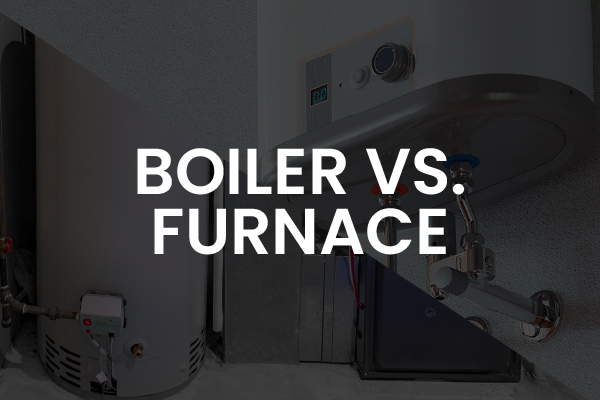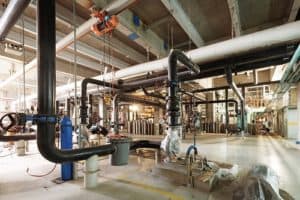
What Is the Difference Between a Boiler and a Furnace?
Since it’s something you rarely have to consider, you might not be immediately clear about the differences between a boiler and a furnace. Most of the time, that’s okay because you don’t need to. However, in the instances that you do need this knowledge, namely because you need repairs or a replacement, it is very important to have a good grasp on this terminology to ensure you make the smart and economic choice that works best for you. To that end, the HEB Plumbing & Sprinkler team has put together this guide on some of the important information to know about the differences between boilers and furnaces.
How a Furnace Operates
A furnace system runs on either natural gas, propane, or electricity. It uses one of these energy sources as fuel for the process it uses to heat your home. To begin that process, the furnace receives a signal from the thermostat telling it to turn on. In response to this signal, the furnace opens the gas valve and ignites the burner component beneath the combustion chamber. Then, the flames from the burner component heat the metal piece in your furnace known as the heat exchanger. The heat circulates through the metal looped tubes and transfers to the passing air. Finally, the blower motor and the fan then move the heated air through your ductworks and vents and distributes it throughout the house to warm your home.
How a Boiler Operates

Boilers can run off of natural gas, electricity, or even wood pellets, although they are not as common. For a boiler, the first step in heating your home is heating the water inside of its holding tank through the use of a gas or oil-fired burner (depending on the type you have). The water is then turned into steam which travels through the pipes to the radiators or convectors. At its destination, that steam then gives off heat which is used to heat the room. Once it has given off sufficient heat, the steam then cools and condenses back to water. The boiler then repeats this process by once again heating this water and turning it back into steam to carry even more heat back to the radiators or convectors, and so on.
What Does Furnace Maintenance Entail?
Once a year, a furnace will need to go through a maintenance tune-up to ensure that everything is running properly. A maintenance tune-up includes the following steps:
- Inspecting the ventilation system and air intake grilles
- Removing any blockages that are found
- Checking the heat exchanger for signs of damage or corrosion
- Examining and cleaning the blower to remove any debris
- Checking the blower motor
- Testing its amp draw
- Inspecting electrical components for signs of damage
- Replacing any wiring that is damaged
- Checking the burner and flame sensor to ensure they are working properly
- Examining the belts for any sign of damage or cracks
- Inspecting the thermostat, calibrating it, and changing the batteries as needed
- Checking, cleaning, and replacing the air filter if necessary
- Checking and testing the system’s safety controls and start up cycle
- If you have a gas or oil furnace, these additional steps will need to be taken for maintenance:
- Examining fuel lines for potential leaks
- Checking and testing the gas pressure
- Checking and testing the burner
- Checking and testing the pilot
- Inspecting the thermocouple for damage
What Does Boiler Maintenance Entail?
As with furnace maintenance, boiler maintenance should be performed once a year to ensure your system is working at its best. In particular, boiler maintenance should include:
A visual inspection of the boiler: Checking for damage or dirt that could affect the various components, such as the safety valve, pressure level gauge, and water level gauge. If any components are dirty or seem to be malfunctioning, these issues should then be addressed.
Checking the Operations and Controls: All of the controls and safety devices on your boiler should be inspected by a plumbing professional at least once a year.
Checking the Flue for Damage: The flue (the pipe that runs from your boiler to the outside of your house) should be checked for damage or obstructions.
Cleaning the Main Boiler Components:
The main components of your boiler should be removed, inspected, and thoroughly cleaned during every boiler inspection. This ensures that they are working properly and that there are no noticeable defects or damages. These components include the following:
- The main burner
- Heat exchanger
- The flue ways
- Ignition Pins
- A visual inspection of the following:
- Flame Sense Device
- Pilot Burner along with its cables and probes
- High-Limit Thermostat
- Boiler Operation
- Provision of Adequate Ventilation
- Flue Effectiveness
- Heating Controls
- Electrical Wiring Connections
- Location of the Boiler
- Any nearby combustible materials should be removed
- Location of the Boiler
- Gas and Pressure Flow
- Safety Devices
- Seals
Furnace Pros and Cons
You may be trying to decide which system is best suited to your needs, so here are some pros and cons about furnaces to keep in mind as you weigh your options. If you’re looking for a quick solution or a budget-friendly option, furnaces may be the best choice for you. Furnaces have a low operating cost when compared to a boiler system, and they can also be installed more quickly.
Some concerns to keep in mind are that the ductwork can have leaks that can lead to a drafty environment. There is also a higher spread of dust and dander which is not ideal for families who have allergies or respiratory issues. Finally, natural gas furnaces run the risk of valve leaks which can cause health and safety issues.
Boiler Pros and Cons

Just as it is important to be aware of the pros and cons of furnaces, it is also important to be aware of the strong and weak points of boilers to make the best decision for your home. Some of the strong points of boilers are that the heat from a boiler is more comfortable due to the extra moisture in the air and it is less noisy than a furnace. The end result of these qualities is that boilers don’t make the heat feel dry and they also foster a more peaceful home environment. In addition, they are more energy-efficient and don’t require ductwork.
However, they are a bit more costly, both because their initial installation is more expensive and because they can raise water costs for your home because of how they operate. They are also prone to leaks which can lead to water damage for your home. In particular, freezing water is an important risk to consider during the winter when the power goes out.
Have a Boiler That Needs Maintenance?
Having this background information is helpful to ensure that you’re making the best choice for you, but there’s no quick substitute for the training, experience, and insight that experts can offer.
Our team of experts at HEB Plumbing & Sprinkler offers thorough boiler inspection services, ensuring that your boiler continues to run strong throughout the coldest parts of winter. If you are in need of boiler maintenance or need help winterizing your plumbing for the winter, contact our team today! We are proud to serve the residents and commercial business owners of Tarrant County with all of their plumbing and sprinkler needs.
